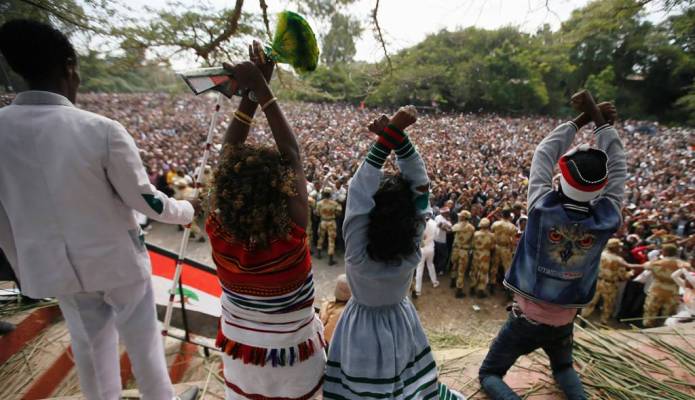Ethiopia declares state of emergency over violent protests
By Tesfa-Alem Tekle
October 10, 2016 (ADDIS ABABA) – The Ethiopian government has declared a state of emergency in the wake of continued anti-government protests across its Oromia region.

“The state of emergency was declared following a thorough discussion by the Council of Ministers on the loss of lives and property damages occurring in the country”, Desalegn said in a televised address to the nation.
According to the government, the state of emergency was declared in order to restore order and contain violent protests expanding to many parts of the Oromya region.
Renewed protests erupted earlier this month when a religious festival taking place in Oromia’s Bishoftu town turned into a violet anti-government protests, claiming the lives of 55 in a stampede that was triggered after police fired tear gas to disperse protesters.
Following the deadly incident, the protests spread to many areas of the Oromia region.
Multiples sources told Sudan Tribune that protesters have so far attacked 11 factories, destroyed public and government properties since attacks in the region began.
They have also continued to block roads linking the region with the capital, Addis Ababa, and burned down many trucks and passenger buses among others.
“We put our citizens’ safety first. Besides, we want to put an end to the damage that is being carried out against infrastructure projects, health centers, administration and justice buildings,” said Desalegn, urging people to stand by government to restore order.
The state of emergency, which become effective from Saturday, 8 October, seeks to reverse the danger posed by forces working in collaboration with foreign enemies to undermine the safety of the people and security and stability of the country.
The Oromos initially staged demonstrations in late 2015 in protest to government plans to expand the capital’s territory to parts of the Oromia region.
However, protesters are now calling for regime change alleging that the Ethiopian government has failed to respect political and economic rights of Oromo people.
Human Rights Watch said up to 500 people were killed in protests within the region.
Meanwhile internet access remained impossible in almost all parts of Addis Ababa.
Government blocked access to fixed line internet service and mobile data nearly a week ago, without any official explanations for the shutdown, although the move appears aimed at suppressing the protests since social media has played a huge role.
Access to internet was allowed Monday afternoon, but turned off after about an hour.
This is the second time since August for Ethiopia to block internet access. However, blocking internet access in the capital for nearly a week is unprecedented in the Horn of Africa nation.
(ST)
